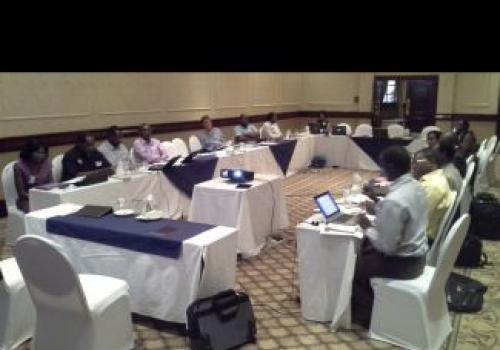The COMESA-EAC-SADC Tripartite Programme Management Units of the Programme on Climate Change Adaptation and Mitigation met in Gaborone, Botswana from January 14 to 16, 2014 to finalise their 2014 work plans and budgets and review progress for the last half of 2013.
Officially opening the meeting, SADC Director for Food, Agriculture and Natural Resources, Mrs Margaret Nyirenda, urged the Programme Management units to be creative but remain focussed on the programme objectives of improving the lives of the vulnerable communities.Mrs Nyirenda noted that positions in the Units, except for the EAC, have now been filled and that this has boosted the capacity to implement the programme. She therefore implored the three Regional Economic Communities (RECs) to accelerate the implementation of the programme in 2014.
The Tripartite programme which is being implemented in 26 Member States, commenced in 2010 and will initially run for five years. It is being funded by the European Union, the Norwegian Ministry of Foreign Affairs and Department for International Development (DFID).The overall objective of the progamme is to address impacts of Climate Change in the COMESA-EAC-SADC Region successful adaptation and mitigation actions which also build economic and social resilience for present and future generations.Speaking at the same meeting on behalf of COMESA, the Tripartite Climate Change Coordinator, Dr Mclay Kanyangarara noted that Climate Change was an area in which the RECs were able to move in unison, which can make the subject a flagship of the Tripartite arrangement.
Dr Kanyangarara observed that the Tripartite approach was the best to achieve regional integration for Africa and that it was gratifying to note that Climate Change is one of the issues collectively tackled thereunder.The programme has, among other things, strengthened the African position and capacity of African countries in negotiations resulting in African voice being heard globally. It is supporting countries to develop strategies in Climate Change as well as scaling up Climate Smart Agriculture.Further, the programme under the Regional Vulnerability Assessment and Analysis has succeeded in institutionalising and harmonising vulnerability assessment in SADC Member States. These assessments have helped avert and mitigate suffering and vulnerability by providing clear information on populations vulnerable to food insecurity and the effects of other shocks including climate change.The Programme Management Units were meeting ahead of the donors’ meeting that is scheduled to take place early February 2014.

